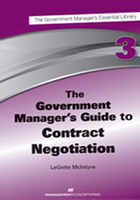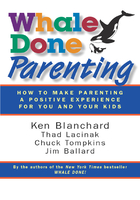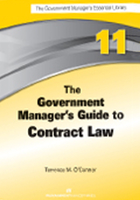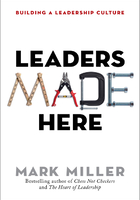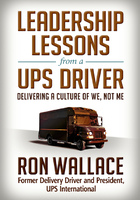EMBRACE YOUR MADNESS
First Among Equals
by Don Frick
By 1991, George SanFacon was weary of mediocrity and isolation in the workplace. He had worked as a cook, mechanic, custodian, engineer, trainer, teacher, painter, and consultant. Everywhere, he saw a lack of community and few efforts to meet human needs. "Mediocrity not only sabotaged the desired outcomes of organizations," says George, "but created a killing field of the human spirit."
Now he was director of Housing Facilities at the University of Michigan in Ann Arbor, a department with several hundred employees, and he felt even more isolated. His people did their jobs well but were reluctant to connect, be authentic, and admit to faults. During a three-day silent retreat, George realized that his traditional management role of holding power over others created a climate of fear.
"Then I asked myself what love would look like in the workplace," remembers George. "What would I do if my mother reported to me, or my sons? I knew that I would want them to be true partners with me in the enterprise. That's what love would look like. Then I realized that the people reporting to me were mothers and sons from other families. And so I decided to change the framework." It was time to step out and live the change he sought to create, even though he did not yet know what form it would take.
George went to his management team and said, "We have high burnout and low morale and I'm part of the problem. I'm asking you to find an outside person to help us go forward." They contacted a facilitator who led a retreat where managers could vent their frustrations with George—and with each other—in a "safe container." The trust-building process had begun.
About the same time, George discovered in Robert Greenleaf's essay "The Institution as Servant," the conceptual model he had been seeking—a structure where the designated leader operates as a "first among equals" in building consensus. George decided to give up unilateral control for a system of shared governance, thereby becoming a peer-level decision maker on a council of equals with his top managers. No one was forced to participate in this experiment but they all did.
By 2004 the organizational chart looked like a mandala, with "an integrated network of overlapping teams that lead and manage the enterprise, enabling the department to achieve significantly higher levels of performance" according to the Facilities Council Handbook. Every council member formally signs a charter pledging to work within the framework in good faith and to the best of their abilities. The university has approved the charter.
Today, no one person alone can hire, fire, promote, or evaluate an employee. It is done by group process and consensus. By the time of George's retirement in the spring of 2004, the commitment to a consensus structure was embedded in the hearts and minds of many partners. George reminds us that "Creating better workplaces is not different than creating better selves and a better world."
Be willing to look at yourself first and your need for power. We are all broken but are more than our brokenness. This model won't work unless you come from a deep place.
You don't have to know the answers; you only need to steward a process of dialogue and consensus decision making. People will support what they help to create.
Go for the long haul. This work takes time.
For more information on the Housing Facilities governance structure, visit the University of Michigan website (www.housing.umich.edu/pdfs/FacHandbook.pdf) where you can download the council handbook and George SanFacon's book Awake at Work: Concepts and Principles for Creating Better Workplaces and a Better World.
Don M. Frick is author of Robert K. Greenleaf: A Life of Servant Leadership.
Creative Convincing for Corporate Change
by Pamela Gordon
Ian's ultimate goal was for his corporation to waste zero resources: "At the end of each day, I want only people and finished product to leave the plant."
"Impossible," you say? What "impossible" goals do you have for organizational change? And if you don't have any, then why not? You have full permission to envision and foster healthier organizations—for people, profit, and/or planet. See how Ian is well on his way to meeting his goal—leveraging his passion, know-how, and creative convincing of others.
Ian McKeown loves his area of the world—the Leven Valley near Glasgow, Scotland. With its bonny Loch Lomond, rolling green hills, and a meandering river, you would too. The Leven River draws a half-circle around Polaroid's manufacturing plant, where Ian is the environmental manager. When Ian talks to Polaroid's managers about adopting procedures that will save money for the company and reduce waste, he uses his training and experience, love of the Leven Valley, and persistence.
At first Ian received many "no's" to his ideas about manufacturing, packaging, and shipping goods differently to reduce expensive waste. One of his most effective techniques is to repeatedly ask seemingly innocent questions about current procedures, until he overcomes people's resistance to trying new processes that will benefit the environment. Ian espouses the Japanese practice Ask Why Five Times. He finds that although people may first respond defensively when asked why or why not, gradually they lose their defensiveness and become open to the idea.
My favorite of Ian's creative convincing techniques is the one he used to persuade the film division's management and operators to use recycling bins. The operators, after testing the quality of the film, used to drop the scrap—film, plastic, and metal parts—into the trash. Management at first rejected Ian's idea for separating and recycling the scraps, claiming that the operators would not want to do so. Knowing that there was a dispute at the time between management and the operators, Ian said to the operators, "Management told me that you wouldn't want to use the bins." That clinched it—the operators agreed to use the recycling bins (in part, perhaps, to spite management).
Ian told me, "You use what you can and most of the time it's easy, as people do want to do a good job." Thanks to people like Ian McKeown, whose waste-reduction ideas have saved his corporation millions of dollars each quarter, a good job for the planet is usually a good job for profit.
If I asked you Five Times, would you latch onto your "impossible" corporate goals, and drive to "yes" with all your passion, know-how, and creative convincing?
Notice corporate waste—whether environmental or otherwise—and give yourself permission to feel disgusted by it.
Use that emotional energy to create ideas for improving the health of the organization, its customers and shareholders, the community, and the environment.
Gain endorsement for your ideas using business language: lead your points with profit in mind—starting with the strategies that yield the highest rewards to profit and planet.
Pamela J. Gordon, Certified Management Consultant, is author of Lean and Green: Profit for Your Workplace and the Environment (Berrett-Koehler, 2001), and president of Technology Forecasters, Inc.—Helping technology executives reduce manufacturing costs and meet environmental goals profitably: www.techforecasters.com.
Be Who You Are
by Mark Levy
How can you make a difference in your organization and in the world? I know of a small yet potent way: Make sure your job reflects who you really are, because who you really are is where your energy lies. Let me illustrate what I mean by telling you about Joel Bauer.
Bauer is a trade show pitchman who The Wall Street Journal Online calls "the chairman of the board" of corporate trade show rainmaking. Over the course of his career, Bauer estimates that he's pitched to twenty million people, and has created three million leads for his clients.
What's his secret? He understands human nature. Bauer knows that what fascinates him will fascinate others—and he brings that knowledge to his work.
Since he was six years old, Bauer has been addicted to unusual entertainment forms, such as magic, stage hypnosis, and carnival stunts. At a trade show, then, he uses a number of intriguing entertainment tools to capture and sway a crowd.
For instance, he might charge into an aisle, cock a rubber band in one hand, and fire it along the floor, where the band rolls forty feet, fast, fast, fast, and just as everyone thinks it's about to die, it reverses direction and races back to his waiting hand.
Or, he'll read the mind of a volunteer who he's never met before.
Or, he'll use his fingertips to divine the serial number on a borrowed dollar bill, while his eyes are sealed with gauze pads and electrical tape.
Whatever the oddity, you can be sure that it's helped him attract a crowd, and once that crowd is happy, Bauer starts his pitch.
To be more effective, try approaching your work like Bauer approaches his. That doesn't mean you should shoot rubber bands and read minds. What it means is that you needn't wall up who you really are when you get to work.
Think about making a hobby part of your business. I know a man who wanted to give seminars on financial planning, but thought numbers would bore his audience. How did he overcome this hurdle? Besides being a planner, he was also a jazz guitarist, so instead of dry seminars, he gave "financial concerts." He'd play the guitar, discuss finance, and use one subject to shed light on the other.
Think about making a much-loved past career part of your current career. Bill Treasurer, the man who compiled this book, did just that. For ten years, he excelled as a professional theme-park daredevil. Bill's act? He'd climb a ten-story tower, set himself on fire, and dive into a water tank. Eventually, he wanted a new challenge, so he went into coaching and consulting—and took his daredevil ethic with him. Now, Bill's company, Giant Leap Consulting, builds courage in organizations by teaching leaders and employees how to take important business risks.
Mark Levy is the founder of Levy Innovation, a marketing strategy firm that makes people and companies compelling. He is the author, or co-creator, of four books, including Accidental Genius: Revolutionize Your Thinking Through Private Writing (Berrett-Koehler, 2000), which has been translated into five languages. Visit him on the web at www.levyinnovation.com.
Wayne's World
by Bill Treasurer
Wayne Bland sounds apologetic as he recounts the story, fully aware of its absurdity. He cites his failed suicide attempt as the reason he's able to make such a positive impact on people today.
"Listen," he says, "I'm telling you from experience that it is precisely when things seem most helpless, when your crisis is most intense, that your breakthrough is ready to occur."
Crisis had grabbed Wayne, at the age of 42, by the throat. Life had gotten bleak and hollow. His twin girls had left for college, his marriage had soured, and he had just quit his job. For Wayne, the afterlife was preferable to midlife.
"I had heard that drowning in cold water was a relatively peaceful death. So, on this dreary November day, I drove to the inlet, walked down to where the channel current was the strongest, and got ready to let the outgoing tide sweep me out to sea."
At the time, Wayne felt like the world was a bitter place. A place where no one could be trusted, especially the people Wayne called the "Leader Liars"—the rulers of the government, big corporations, and the church. Looking back, though, Wayne thinks his suicidal rage had less to do with his disappointment with the rulers of the world, and more to do with his disappointment with himself. He hated the fact that, despite endless opportunities, he hadn't done a single thing to improve the world. All he had done was point a finger at it. "Ultimately," he says, "suicide isn't about anger. It's about selfishness."
So there he was, steeped in self-pity, ready to end it all. And then something unusual happened. Something… well… mad. There by the water's edge, a dolphin popped up his head, squawked loudly, and swam back under. Wayne, startled, wiped his eyes. Just as he regained his focus, he could see two dolphins squawking away at him. "This may sound crazy," he says, "but I believe they were God's messengers trying to talk me out of it. Two ocean angels."
Today Wayne Bland is known as "The Recovery Baron." He is the founder of Recovery Place, Inc. in Savannah, Georgia, which has treated over 7000 people for drug and alcohol abuse. Ironically, Wayne now devotes his life to touching the lives of people who, like he once did, have seemingly lost all hope.
Asked what he learned from his crisis moment nearly 20 years ago, Wayne is reflective. "Look, it's just plain more productive to walk through your crisis moment than to run from it. It's when you hit rock bottom that there's no place to go but up. So when madness pays you a visit, use it. I drew up the plans for Recovery Place the same day that the ocean angels saved my life."
Do you want to make a difference in the world? It might help to start by exploring the things you've learned in your moments of crisis. Sometimes what looks like insanity, or even madness, may be the entry point for valuable lessons that can be used to touch the lives of others. This is what it means to be a wounded healer. Taking your pain and putting it to good use.
When your life takes a mad turn for the worse, hang on to the knowledge that it's always darkest before the dawn.
During times of madness, ask yourself, "How can I embrace this craziness instead of run from it? How can I put it to good use?"
Remember, there is no coming into consciousness without pain. What seems at first like madness, may in fact be your awakening into a more sober and more reality-based life.
Bill Treasurer loves being in the midst of people's courage. He is founder of Giant Leap Consulting, a courage-building company, and the author of Right Risk:Ten Powerful Principles For Taking Giant Leaps With Your Life (Berrett-Koehler, 2003). He also served as the editor of this book. To learn more about Giant Leap Consulting, go to www.giantleapconsulting.com. To learn more about Recovery Place, call (912) 355-1440.

